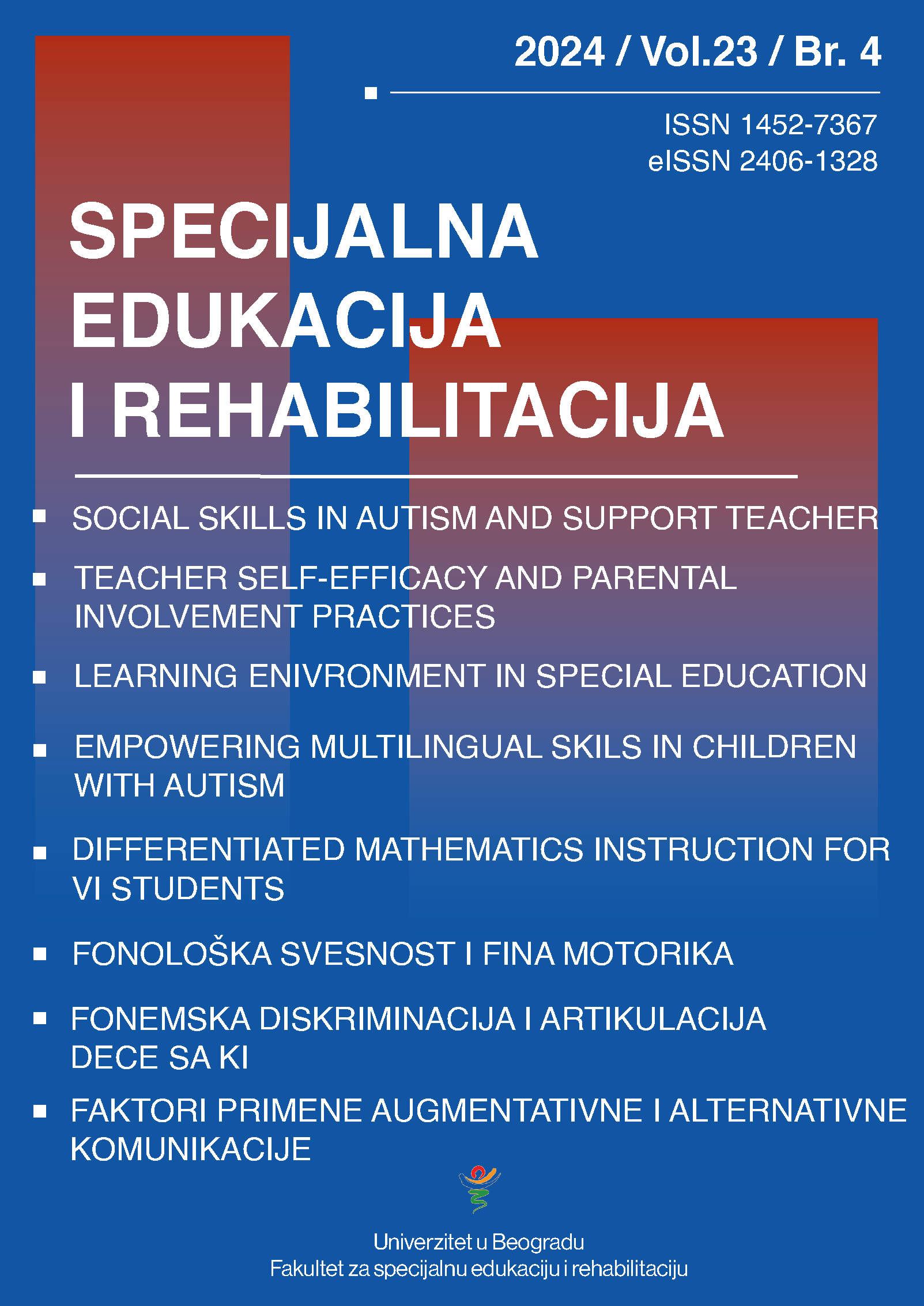Examining the connections between teacher self efficacy and parental involvement practices
Sažetak
Uvod: Samoefikasnost nastavnika i uključenost roditelja usko su povezani i oba mogu imati značajan uticaj na uspeh učenika. Ciljevi: Ovaj rad ispituje veze između samoefikasnosti nastavnika i prakse uključenja roditelja. Ideja da roditeljsko učešće i samoefikasnost nastavnika pozitivno utiču na akademska postignuća učenika široko je prihvaćena. Metode: Sprovedena je kvantitativna studija kako bi se ispitali nivoi samoefikasnosti i uključenosti roditelja 600 nastavnika specijalnog obrazovanja u Grčkoj. Rezultati: Rezultati su pokazali da je samoefikasnost nastavnika u značajnoj pozitivnoj korelaciji sa uključenošću roditelja u pedagoški rad. Zaključak: Sve u svemu, istraživanje prikazano u ovom članku sugeriše da nastavnici specijalnog obrazovanja u Grčkoj sa visokim nivoom samoefikasnosti češće uključuju roditelje u obrazovanje svojih učenika. Ovo je veoma važno jer visok nivo uključenosti roditelja može doprineti boljem obrazovanju učenika sa posebnim potrebama.
Reference
Al-Dababneh, Κ. (2016). Quality Assessment of Special Education Programmes: Listen to the Parents, International Journal of Special Education, 31(3), 480-507. https://files.eric.ed.gov/fulltext/EJ1120729.pdf
Barni, D., Danioni, F., & Benevene, P. (2019). Teachers' Self-Efficacy: The Role of Personal Values and Motivations for Teaching. Frontiers in psychology, 10, 1645. https://doi.org/10.3389/fpsyg.2019.01645
Creswell, J. W. & Creswell, J. D. (2022). Research design: Qualitative, Quantitative, and Mixed Methods Approaches (6th ed.). Sage Publications. https://us.sagepub.com/en-us/nam/research-design/book270550#preview
Dussault, M., Deaudelin, C., & Brodeur, M. (2004). Teachers’ Instructional Efficacy and Teachers’ Efficacy toward Integration of Information Technologies in the Classroom. Psychological Reports, 94(3), 1375-1381. https://doi.org/10.2466/pr0.94.3c.1375-1381
Epstein, J. & Sheldon, S. (2019). The Importance of Evaluating Programs of School, Family and Community Partnerships, Aula Abierta, 48(1), 31-42. https://doi.org/10.17811/rifie.48.1.2019.31-42
Ertmer, P. A., Ottenbreit-Leftwich, A. T., Sadik, O., Sendurur, E., & Sendurur, P. (2012). Teacher beliefs and technology integration practices: A critical relationship. Computers and Education, 59(2), 423–435. https://doi.org/10.1016/j.compedu.2012.02.001
Goddard, R. D., Hoy, W. K., & Hoy, A. W. (2000). Collective Teacher Efficacy: Its Meaning, Measure, and Impact on Student Achievement. American Educational Research Journal, 37(2), 479-507. https://doi.org/10.3102/00028312037002479
Herman, K. & Reinke, W. (2016). Improving teacher perceptions of parent involvement patterns: Findings from a group randomized trial. School Psychology Quarterly, 32(1), 89-104. https://doi.org/10.1037/spq0000169
Hill, N. E., & Taylor, L. C. (2004). Parental School Involvement and Children’s Academic Achievement: Pragmatics and Issues. Current Directions in Psychological Science, 13(4), 161-164. https://doi.org/10.1111/j.0963-7214.2004.00298.x
Koch, K. (2016). The Influence of Parenting Experience on Special Education Teachers' Pedagogy, International Journal of Special Education, 31(3), 1-19. https://files.eric.ed.gov/fulltext/EJ1120684.pdf
Meador, D. (2019). Cultivating Highly successful parent teacher communication. ThoughCo. Retrieved from: https://www.thoughtco.com/tips-for-highly-successful-parent-teacher-communication-3194676
Minghui, L., Lei, H., Xiaomeng, C. & Potmesilc, M. (2018). Teacher Efficacy, Work Engagement and Social Support among Chinese Special Education school teachers, Frontiers in Psychology, 9(648), 1-8. https://doi.org/10.3389/fpsyg.2018.00648
Park, S. & Holloway, S. (2018). Parental Involvement in Adolescents’ Education: An Examination of the Interplay Among School Factors, Parental Role Construction, and Family Income, School Community Journal, 28(1), 9-36. https://files.eric.ed.gov/fulltext/EJ1184925.pdf
Roy, M. & Giraldo-García, R. (2018). The Role of Parental Involvement and Social/ Emotional Skills in Academic Achievement: Global Perspectives, School Community Journal, 28(2), 29-46. https://files.eric.ed.gov/fulltext/EJ1201955.pdf
Versland, T. (2018). Principal Efficacy: Implications for Rural ’Grow Your Own’ Leadership Programs. The Rural Educator, 35(1), 13-22. https://doi.org/10.1016/j.ijer.2013.10.004
Villiger, C., Wandeler, C., & Niggli, A. (2014). Explaining differences in reading motivation between immigrant and native students: The role of parental involvement. International Journal of Educational Research, 64(1), 12–25. https://doi.org/10.1016/j.ijer.2013.10.004
Vongkulluksn, V. W., Xie, K., & Bowman, M. A. (2018). The Role of Value on Teachers’ Internalization of External Barriers and Externalization of Personal Beliefs for Classroom Technology Integration. Computers and Education, 118, 70–81. https://doi.org/10.1016/j.compedu.2017.11.009
Sva prava zadržana (c) 2024 Specijalna edukacija i rehabilitacija

Ovaj rad je pod Creative Commons Autorstvo-Deli pod istim uslovima 4.0 međunarodnom licencom.

